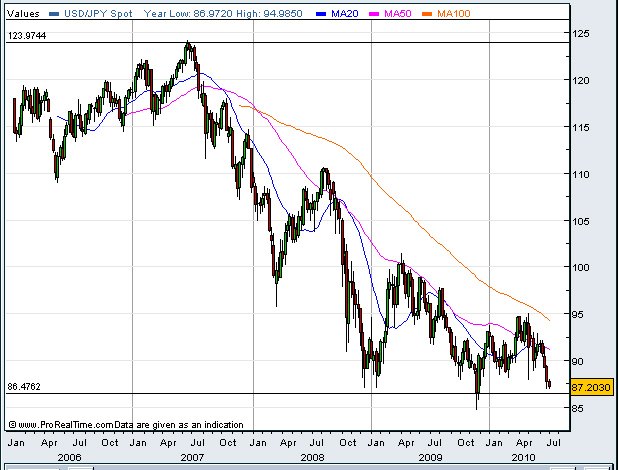Japanese Car Makers Worried About Sumo-Sized Yen

There was a time, in summer of 2007, when a dollar bought more than 120 yen. Once you arrived in Tokyo, you quickly wished it would have bought more. Now, the dollar buys about a third less. The dollar/yen rate had been at a downward trajectory since that summer of 2007. What made the yen really expensive was a company called Lehman Brothers, and the fallout following their bankruptcy in 2008. For inexplicable reasons, the yen is seen as a safer currency than the greenback. Should you make the mistake of stepping off the plane with Euros in your pocket, you would be in for an even bigger shock. In July 2008, a Euro bought 170 yen. Now, it’s down to 109. For even more inexplicable reasons, some mentally unstable people still talk about an undervalued yen.
You may not travel to Tokyo frequently enough to give a hoot. But Japanese auto manufacturers don’t want to take it any more.
The chairman of the Japan Auto Manufacturers Association (JAMA) said today he hopes the Japanese government will lend a hand to reel-in the strengthening yen, reports The Nikkei [sub]. “If the yen’s strength continues, there will be a negative impact on Japan’s economy,” said Toshiyuki Shiga. “If there are any steps the government could take, then we would like to ask for such measures,” said the chairman, who is also COO of Nissan.
A strong yen makes exported cars more expensive (or less profitable,) and it diminishes overseas profits when they are consolidated into the books back home. About half of the vehicles produced in Japan are usually exported. Japanese automakers currently enjoy a rising domestic demand. But they are worried about a German-sized hangover once the government subsidies expire later this year.
Japan could use what Europe has: A soft currency. In the first six months of 2010, German car sales were down 29 percent. In the same period, the German auto industry produced 23 percent more cars than in the first half of 2009. Why? Strong exports, driven by a soft Euro. (Why doesn’t anybody complain about an undervalued Euro? I could use some Euro value. Help me out.)
In the “if there are any steps the government could take” department, there is only so much a government can do. The yen is freely traded. The Prime Rate in Japan stands at an all-time low of 1.45 percent. No room for play there.
There is another government in play: The Chinese. The Wall Street Journal reports that China “has significantly increased its purchases of Japanese government bonds in recent months.” This most likely intensified in the past week after China relaxed the Yuan/USD peg. That vilified peg had forced the Chinese to buy dollars to maintain the peg. With the peg relaxed (as requested umpteenth times by U.S. government figures and lawmakers) there is less reason for Chinese dollar buying. That money now can go to Tokyo, driving up the yen even more.
If the world market thinks a country with a deficit of 227 percent of GDP is a safer place to park your money at next to no interest, then this should give us pause to think.

Bertel Schmitt comes back to journalism after taking a 35 year break in advertising and marketing. He ran and owned advertising agencies in Duesseldorf, Germany, and New York City. Volkswagen A.G. was Bertel's most important corporate account. Schmitt's advertising and marketing career touched many corners of the industry with a special focus on automotive products and services. Since 2004, he lives in Japan and China with his wife <a href="http://www.tomokoandbertel.com"> Tomoko </a>. Bertel Schmitt is a founding board member of the <a href="http://www.offshoresuperseries.com"> Offshore Super Series </a>, an American offshore powerboat racing organization. He is co-owner of the racing team Typhoon.
More by Bertel Schmitt
Latest Car Reviews
Read moreLatest Product Reviews
Read moreRecent Comments
- Ajla In high school I really wanted a yellow GTO.
- Lou_BC Sweet car.
- FreedMike With 157K miles, that's basically a beater that looks good. Plus, I heard Honda CVTs turn dicey with age. I'm a "no" at $12,500, but someone's heart will go all aflutter over the J-vin (Ohio-vin?) and pay up. With a manual in the same shape, I'd be in for a LOT less.
- EBFlex More proof the EV world is crumbling. In a market with supposedly “insatiable demand”, these kinds of things don’t happen. Nor do layoffs.
- Buickman 17 Lacrosse, 18 Enclave, 19 Stingray Drop.each Red, Tan guts.I just want to feel this moment, and I own it~ (them, sic)


































Comments
Join the conversation
Just like the 1990s all over again. Back then I frequently traveled to Japan and the Yen traded at around 90-100 to the $US. Purchasing power wise, the Yen would need to be at around 200 to the dollar for rough parity. Very different from the Yuan/Dollar situation.
If you include all the off book U.S. Govt spending, we make Greece look like a well managed govt. If you further pull forward all the future obligations, it's so ridiculous, there is no reasonable way out. Gets even better when you consider the GDP is artificially manipulated, upward of course.